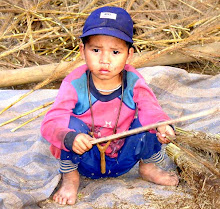If we are going to support a particular mission program that works with the poor one of the things we should research is whether or not they are creating dependency in their efforts to lift people out of poverty. We can certainly help someone out of poverty by simply giving them an unending source of money. But then we have only made them dependent upon us for that "lifeline" and it could never go much beyond our own means. It is better if we can give them ways to escape poverty without creating dependency upon rare outside sources.
If you give a man a fish you feed him for a day. If you teach a man to fish you feed him for a lifetime.
Do you remember that proverb? It's a good one. Paul teaches us in 2 Thessalonians 3:7-12:
"We were not idle when we were with you, nor did we eat anyone's food without paying for it. On the contrary, we worked night and day, laboring and toiling so that we would not be a burden to any of you. We did this, not because we do not have the right to such help, but in order to make ourselves a model for you to follow. For even when we were with you, we gave you this rule: 'If a man will not work, he shall not eat.' We hear that some among you are idle. They are not busy; they are busybodies. Such people we command and urge in the Lord Jesus Christ to settle down and earn the bread they eat."
He also says in 1 Thessalonians 4:11-12:
"Make it your ambition to lead a quiet life, to mind your own business and to work with your hands, just as we told you, so that your daily life may win the respect of outsiders and so that you will not be dependent on anybody."
Paul's goal is not that people would simply become recipients of missionary's help, but that they would be better workers than before, because of their faith, and that they would be able to contribute, not just consume.
Many people talk about two types of mission work--helping people spiritually (evangelism, discipleship, church planting, etc.) and helping people physically (relief efforts, feeding programs, micro financing, agriculture, water systems, etc.) And we tend to think of dependency in the realm of physical help. But dependency can happen in two ways:
1) Making people dependent upon us for their physical needs.
2) Making people dependent upon us for the spiritual needs.
If we do a program where we feed people--Are there ways to help them to be able to feed themselves?
If we do a church plant where we teach/preach to people--Are there ways to train a few to be able to teach themselves?
If we send out national evangelists and support them with our funds--Are there ways to help them to be able to support themselves or for the local churches to be able to support them?
These are the questions and issues we must address to get around creating dependency.
Tomorrow I'll attempt to answer the question: "What's wrong with dependency? If we are doing something to help people, isn't that a good thing?"
Showing posts with label Native Missionaries. Show all posts
Showing posts with label Native Missionaries. Show all posts
Monday, March 9, 2009
Sunday, March 8, 2009
Dependency Mission 04
One mission agency that collects funds to support native missionaries built a Bible college to train them before sending them out. They visited many villages asking them each to send students to come study and then they would be supported as native missionaries for a certain monthly amount. Each village could send two students for free. What happened? People who weren't even Christians were enrolling in the school. It was free. They could learn to lead religious services for another religion if someone was going to pay them to do it. They said all the right things and went through all the right hoops. We don't know if the administrators ever found out or if they were concerned about this problem.
In The Location a certain missionary worked with the pastor of one of the local churches. He noticed this pastor was always asking for things from all the foreigners who lived in town. He would ask for tiling for his house/church, instruments, a digital camera, a computer, a printer, a motorcycle, money to buy land, money for English school, money for his son to get married, etc. The missionary tried to give the pastor opportunities to work during the week so that he could earn enough money to purchase these things for himself. The pastor spent most of his time at home during the week without much to do other than going around and asking people for money. When he finally had an opportunity to work with a certain employer, he declined because he found other missionaries who were willing to just give him all the stuff he asked for without having to work. Now he has a computer at his house that he doesn't know how to use.
An Arab travel guide in the "Holy Land" noticed that many of the groups coming over on tours were American Christians who had little experience in other cultures. Many of them were nervous and excited about meeting a real live Muslim for the first time in their lives. And as a result, they would often try different subtle and some not-so-subtle ways to evangelize him. This man discovered that if he "converted" to Christianity he would get bigger tips than when he wouldn't convert. Consequently, every time he led a group that tried to share Christ he would act like he didn't know anything, pray a prayer of acceptance with them, and "convert" to Christianity. He was able to make a lot of money.
The last story is more of a "deceive those suckers" than a dependency story. But many more stories could be told.
It seems to me that the danger in the common mission agency practice of giving lots of things to poor people on the "mission field" is in creating a welfare state. You know what I'm talking about. People in our own country don't want to go out and get a job because it is easier just to live on government assistant checks. Then we have to ask the question of whether or not those assistance programs are working or just continuing and adding to the problem.
Most mission agencies (that are honest, and I believe most of them are honest) would be aghast at the thought that their programs are contributing to such a "welfare state" type situation. The problem is that we often don't realize how little it takes to do this. You see, if in the US a person got a government assistance check for $100 a month, it wouldn't be enough to live on. They would still need to go out and get a job. But half of that amount (what we might spend on one nice dinner) is more than enough for people to live on in many of the poorest countries of the world. It is not wrong to be generous, but we simply need to be aware of the potential negative situation we might be creating or contributing to. Are there better ways to help them help themselves rather than simply making them dependent upon us indefinitely?
Do you have a story? If so, please share.
Tomorrow I'll share some scriptures on the subject of dependency...
In The Location a certain missionary worked with the pastor of one of the local churches. He noticed this pastor was always asking for things from all the foreigners who lived in town. He would ask for tiling for his house/church, instruments, a digital camera, a computer, a printer, a motorcycle, money to buy land, money for English school, money for his son to get married, etc. The missionary tried to give the pastor opportunities to work during the week so that he could earn enough money to purchase these things for himself. The pastor spent most of his time at home during the week without much to do other than going around and asking people for money. When he finally had an opportunity to work with a certain employer, he declined because he found other missionaries who were willing to just give him all the stuff he asked for without having to work. Now he has a computer at his house that he doesn't know how to use.
An Arab travel guide in the "Holy Land" noticed that many of the groups coming over on tours were American Christians who had little experience in other cultures. Many of them were nervous and excited about meeting a real live Muslim for the first time in their lives. And as a result, they would often try different subtle and some not-so-subtle ways to evangelize him. This man discovered that if he "converted" to Christianity he would get bigger tips than when he wouldn't convert. Consequently, every time he led a group that tried to share Christ he would act like he didn't know anything, pray a prayer of acceptance with them, and "convert" to Christianity. He was able to make a lot of money.
The last story is more of a "deceive those suckers" than a dependency story. But many more stories could be told.
It seems to me that the danger in the common mission agency practice of giving lots of things to poor people on the "mission field" is in creating a welfare state. You know what I'm talking about. People in our own country don't want to go out and get a job because it is easier just to live on government assistant checks. Then we have to ask the question of whether or not those assistance programs are working or just continuing and adding to the problem.
Most mission agencies (that are honest, and I believe most of them are honest) would be aghast at the thought that their programs are contributing to such a "welfare state" type situation. The problem is that we often don't realize how little it takes to do this. You see, if in the US a person got a government assistance check for $100 a month, it wouldn't be enough to live on. They would still need to go out and get a job. But half of that amount (what we might spend on one nice dinner) is more than enough for people to live on in many of the poorest countries of the world. It is not wrong to be generous, but we simply need to be aware of the potential negative situation we might be creating or contributing to. Are there better ways to help them help themselves rather than simply making them dependent upon us indefinitely?
Do you have a story? If so, please share.
Tomorrow I'll share some scriptures on the subject of dependency...
Thursday, March 5, 2009
Dependency Mission 02
"Just $30 a month and you can support a native missionary who already knows the language and the culture, and who will risk their lives to preach the gospel to thousands."
Sounds good, right? There are a number of mission agencies in the world who advertise like this. One in particular will give you a free book telling you why Westerners should not be missionaries because it takes more than $30,000 to move them there and that same money could support hundreds of native missionaries who don't have to go through language training or worry about culture shock.
Many times I've been asked the same question: "Why should we come visit you when we could just send the money from the plane ticket to hire locals to do the same work?" And in many cases, I do think sending some money would be a better thing to do. In other cases, I don't think very much money ever comes in from people who've almost decided to go.
But arguments for supporting native missionaries, sponsoring children and donating to missionary charity efforts tend to rely on making sure you know that we over here (on the mission field) are better off if you give us your money versus you spending that money on something else, whether that be a trip to the field or a swimming pool in your back yard. So the only thing you consider is whether you should give your money to "missions" or spend it on yourself. You can see where this is leading. You feel guilty spending money on yourself so you give it to missions.
What is usually left out of consideration (and many agencies don't want you to go there) is whether or not the missions program you are giving to is a good thing. Most just assume, "It's missions so it's all good." "They're helping the poor--what could be wrong with that?" "We have so much compared to them. What is just a little for us really goes a long way over there."
Sounds good, right? There are a number of mission agencies in the world who advertise like this. One in particular will give you a free book telling you why Westerners should not be missionaries because it takes more than $30,000 to move them there and that same money could support hundreds of native missionaries who don't have to go through language training or worry about culture shock.
Many times I've been asked the same question: "Why should we come visit you when we could just send the money from the plane ticket to hire locals to do the same work?" And in many cases, I do think sending some money would be a better thing to do. In other cases, I don't think very much money ever comes in from people who've almost decided to go.
But arguments for supporting native missionaries, sponsoring children and donating to missionary charity efforts tend to rely on making sure you know that we over here (on the mission field) are better off if you give us your money versus you spending that money on something else, whether that be a trip to the field or a swimming pool in your back yard. So the only thing you consider is whether you should give your money to "missions" or spend it on yourself. You can see where this is leading. You feel guilty spending money on yourself so you give it to missions.
What is usually left out of consideration (and many agencies don't want you to go there) is whether or not the missions program you are giving to is a good thing. Most just assume, "It's missions so it's all good." "They're helping the poor--what could be wrong with that?" "We have so much compared to them. What is just a little for us really goes a long way over there."
But just continually supporting native missionaries or sponsoring a child can create dependency. More on this later.
What about you? Do you have experience in giving out of guilt while assuming the recipient has a worthy program?
Tomorrow I will share with you about what happens when some missionaries come to town with big plans...
Labels:
Child Sponsorship,
Dependency,
Native Missionaries
Subscribe to:
Posts (Atom)









